After a few weeks of rampant media speculation, Kyle Dubas said on Monday what he wouldn’t say directly in his end-of-season media availability: Mike Babcock will be back next year as Leafs head coach.
Mike Babcock will be back as head coach in TOR. Leaf GM Kyle Dubas, when asked about Babcock’s status:
“We’re all in on Mike and Mike is all in on us. We’ve had productive management meetings as an organization and Mike and I have had some really good meetings as well…
— Bob McKenzie (@TSNBobMcKenzie) May 6, 2019
Dubas also added: “There are things we need to improve upon. There are things we need to do to adapt and evolve and continue to get better. As an organization, we believe we can do that together.”
— Bob McKenzie (@TSNBobMcKenzie) May 6, 2019
Of course, this won’t stop the debate from raging on as to whether or not he should be back, or the length of his leash entering 2019-20.
Let’s start from the beginning, with a quick Coles Notes version of Mike Babcock’s first three seasons in Toronto:
- 2015-16 — We can all agree this was a masterstroke, getting a team that low on depth of talent to be as competitive as it was most nights without ruining the lottery odds. As forgettable as the season itself was, a ton happened in this season that helped set the stage for the Leafs’ faster-than-expected turnaround.
- 2016-17 — More of the same getting a team that young into the playoffs with major steps forward taken by a wide variety of young and prime-aged players.
- 2017-18 — A disappointing end in Game 7, but it was hard to complain. All kinds of regular season records were set at the franchise and individual levels by a team that was dead last two years prior.
The 2018-19 season was a whole new challenge after the expectations naturally ratcheted up massively with the John Tavares addition. This season was not going to be measured by the regular season franchise records or individual accolades — playoff success was now the barometer.
During the regular season, there were some reasons to be concerned with substantial stretches of the team’s play, particularly down the stretch, but it was ultimately a 100-point season and the first in which it was obvious that Leafs players were making business decisions on many game nights. This team knew it was very talented and that it was going to be there — the playoffs, that is — at the end of the year.
You also have to factor in that there was a contractual holdout with William Nylander at play — Kyle Dubas has praised the players and the coaching staff for how they dealt with that, and rightfully so — a significant Auston Matthews injury, a significant Jake Gardiner injury, a significant Travis Dermott injury, his GM’s backup goalie decision went south (that alone represents a good chunk of the five-point difference between last season’s point total and this season’s), and Frederik Andersen stumbled down the stretch.
This was the first ever coach to lead the Leafs to back-to-back 100-point seasons and we were now at the point where playoffs are a given, so while they did take a small step back in the standings, there was nothing too concerning about it all just yet when stepping back and looking at the big picture.
What was a little worrying was that we couldn’t be totally sure that this was a team that knew exactly how to ramp it up come playoff time; it’s still quite young overall and had not proven it could yet. The team’s play in big games like Tavares’ return to Long Island — their most embarrassing loss of the season, hands down — didn’t inspire confidence in this respect, either. It was something of a wait-and-see situation: Could this team flip a switch at playoff time?
The 2019 Playoffs
That brings us to the playoffs.
At risk of being labeled a Babcock apologist (probably too late), here is what I didn’t like about how he managed the playoff series against Boston:
- Trevor Moore (and at times Tyler Ennis) didn’t play enough
- He didn’t experiment with loading lines enough situationally
- He didn’t switch Nylander and Gauthier’s wingers when it was obvious his third line wingers were his fourth line wingers as far as the spark and impact provided
- He, Jim Hiller, or both did not leave PP1 out long enough. I’m not totally against two good units and a more even distribution of ice time, but it was obvious PP2 was simply running out the clock and killing momentum. That said, it gets overlooked here a lot that PP1 wasn’t exactly showing a ton of promise for the most part, either.
- Patrick Marleau played too much late in Games 6 and 7
Here were the issues that I view as not his fault:
- Frederik Andersen’s Game 7 performance
- William Nylander’s miserable season and shot confidence
- Nazem Kadri’s suspension
- Lack of C depth (Gauthier isn’t it)
- Lack of LW depth (mostly… he could’ve moved Moore up)
- Lack of RD depth (mostly… I’d have played with Muzzin there more often after his arrival, but Gardiner’s injury basically ended that). He has two lefties on the right, one of which is Ron Hainsey and one of which is a struggling Travis Dermott, plus Nikita Zaitsev.
- Zach Hyman’s injury
- Jake Gardiner’s injury
- Travis Dermott’s injury and play coming back from it
And here is what went well in the playoffs: The team did flip the switch with its 5v5 play. The Leafs outplayed Boston and should’ve won the series based on how they controlled the scoring chances and possession at even strength. After watching the team play some really uninspired stretches defensively this season, and rely far too much on stretch hockey offensively, there was a big improvement in how this team checked, how it broke out of its zone (with speed in organized five-man units), and how it dug in on its puck battles.
In his postmortem, Kyle Dubas pointed to Game 5 as the example of he wants the team to play. That looked a lot like Babcock hockey from the peak Red Wings days — fast, skilled, hard on pucks, relentless back pressure, tremendous puck speed, little space for the other team through the neutral zone, good details. This all requires a lot of buy-in from the players and it doesn’t happen if there is a coach in charge whose message isn’t resonating in the room.
Some of this produces trade-offs with the gripes I made above — he wants his players fresh, skating shorter shifts than average at 5v5 and on the power play, so his group can skate the opposition into the ground over 60 minutes. He leans on veteran players who he feels he can trust to do it right over 200 feet when the chips are down or the stakes are high — at times to a fault (in that respect, it’s hard to find a coach who doesn’t).
He’s going to need to show a willingness to compromise in some of these areas or it could be his undoing. Babcock, as much as he certainly can be stubborn, probably doesn’t get enough credit here for his adaptability, though — he healthy scratched Matt Martin down the stretch and in to the playoffs last season and sat Leo Komarov when it became apparent he was struggling (partially due to injury) in favour of Andreas Johnsson. Seeing is believing, but I’m guessing that Babcock made some verbal commitments to certain changes in the last couple of weeks in the board-room meetings with Dubas.
If the Leafs played the way they did down the stretch in this series and lost in five, I’d be far more open to the idea that Babcock has lost the room, can’t get the most out of this talented group of (mostly young) players, and a change is probably what’s needed. Instead, they lost a series to the second-best NHL regular season on special teams, bottom-six scoring, a Nazem Kadri suspension, Game 7 goaltending, and a little less puck luck at 5v5. Some of that Babcock is going to have to own, and some of it is just the nature of the sport, the breaks, and playoffs, but it was hardly a fireable season-long performance from the head coach when viewed in totality.
At his end-of-year availability, Dubas spoke about the extra 1-2% that is needed next year to take the next step and make a real run at the Cup. Babcock’s need to improve is definitely included in that 1-2%, but make no mistake, he’s played his part in why the team is 95% of the way there.
On “accountability”
Here at MLHS, I’ve transcribed the majority of Mike Babcock’s media interviews since he’s been the Leafs’ head coach. He’s not exactly the type to never take accountability when his team falters. In fact, accountability is kind of his thing.
From the season-end availability:
You have an obligation as a management team to do a lot of work yourself to improve yourself as a coach, as a manager, but also to improve the team within the salary structure and help the guys to get where we want to go.
A few quick examples from years past:
I am talking about creating a family atmosphere. I’ve said this a number of times: It’s kitchen-table accountability. When you sit down with the people you love at your kitchen table at home, if you say something stupid, someone calls you on it every single time. If you do anything out of line in your family, they keep you grounded. But they can.
That same kind of love has to be in our room — that we’re willing to share, willing to stand up and say, “Hey, you’re not doing it right.” That’s all of us. I think that’s a real important thing, but I also think it’s a process, and we’re in that process now.
–
If you want to be great, be accountable. If you want to be a part of something great, be accountable. Home ice shines a bright light on that. Do your job so your team can do theirs. If you really want to hold yourself accountable, do your job when high expectations meet a big opportunity. Embracing pressure means delivering when it matters most. Accountability is the No. 1 word in team sports. It’s the No. 1 word in the world of business.
– Mike Babcock, Leave No Doubt (pp. 87-88). McGill-Queen’s University Press. Kindle Edition.
I understand that some in the media and fan base are getting worked up because of the contrast between Dubas taking responsibility for specific on-ice failings — even some things that didn’t even really make sense — versus Babcock’s much cagier approach to handling the media; Babcock will admit there are plenty of things he’d change in hindsight and that he wants to improve on as a coach, but he’s probably not dishing out specifics.
Keep in mind Babcock, unlike Dubas, has to speak to the Toronto media every single day throughout the season — often times twice a day. He knows what this market is all about — he pretty much knew exactly how to navigate the media landmines upon arrival in May 2015 — and he rarely dangles red meat for the baying wolves if he doesn’t have to.
As a quick example (there are many), he loves Jake Gardiner and he did not see any need for him to put himself in the line of fire as he did in his post-game interview last Spring after his dash-five Game 7 performance. He’s very fond of the saying, “Don’t get in your own way” — his manner of saying don’t make life harder on yourself than it has to be. If you’re looking to him to provide the media with the bullets with which to shoot him, it is never going to happen.
When he does slip up, like his comment that got interpreted as a shot at some of his depth players on defense not long before the playoffs, he will own it and apologize for it.
When Babcock talks about improving the team’s depth, he uses “We,” and he includes himself in the Leafs’ management team. Some fans take this for arrogance, but he’s played a very active role in player recruitment (FA signings from Marleau to Tavares, regular contact with European free agents, sometimes years in advance, as we saw again today with the addition of Ilya Mikheyev) and he has a voice at the table on important player acquisition decisions. This was always part of the deal from the beginning back when Brendan Shanahan named him head coach in 2015 — before Lou Lamoriello was hired or Kyle Dubas was GM — and paid him more than any coach in the history of the game.
By and large, Babcock’s influence here has been a major positive in this regard. His reputation and his reach as the gold-medal winning Team Canada head coach are massive — it played a role in them landing Tavares, to be sure, in addition to the international clout he has with European FAs. Babcock called his shot when he first arrived and said the Toronto Maple Leafs would become a destination again — a laughable statement at the time in the eyes of large swaths of the hockey world, including cynical Leafs fans, but it’s become a reality and he’s been a central figure in making that happen.
There are legitimate criticisms of Babcock to be made after the second-straight first-round playoff exit in Boston. His own lack of accountability for the team’s early playoff exit really isn’t chief among them.
On Dubas’ initial non-endorsement
Were you satisfied with the coaching in Game 7?
Dubas: In Game 7… I mean, with anything, when you are evaluating a micro-event, you start to get in trouble when you are running a franchise. I know everyone would like me to give a condemnation or a massive vote of support for one single game, but when you have an 89-game season and a years-long track record, I think it is best, when making the decision as an organization, to focus on that. I thought our coaching staff did a good job this year with our group in Game 7 of the series. I thought we started fine. We allowed the goals and then we played really well in the middle of the game. In the third period, we couldn’t gain any traction. I think that falls on everybody starting with me — not the coaching staff, not the players.
Kyle Dubas’ comment about micro-events here is one to keep in mind. Many noted him side-stepping the question about Babcock’s job security shortly thereafter — there is no doubt he avoided an opportunity to nip the whole storyline in the bud — but the point he’s made here is still an important comment to note. This isn’t just Dubas talking his way around a question — he’s very much aware of the biases at play here and how bad decisions can be made based on a break or two in Game 7 of a very tight and competitive series.
Taking a step back, here are a few things we know about Babcock’s teams and his time in Toronto:
- Rarely has an important young player taken a step back developmentally or been mistreated. Fans have largely spent their time arguing about the Josh Leivos, Brendan Leipsics and Frank Corrados. There is certainly no Ron Wilson vs. Nazem Kadri in there.
- He’s an advocate of skill and speed over four lines, although he balances that with a nuanced view of how beneficial size can be.
- A quick look at his teams’ rosters historically shows he is very Euro-friendly
- His teams don’t fight and take few penalties
- He has an analytics person on the coaching staff (has for years dating back to Detroit) and is open to new information. He’ll cite expected goals and 5v5 scoring chances in conversation with the media (This isn’t Randy Carlyle we’re talking about).
- He’s a big Jake Gardiner fan (he’s never wavered on this when he easily could’ve after high-profile mistakes) and highly values defensemen with his skill set.
I could go on and on here, but the point is that it doesn’t strike one as such a large philosophical gap between the two that Dubas and Babcock can’t find solutions together while challenging each other to improve in a healthy, productive manner.
Dubas: From the day that Mike came on, he is on all the time. I think people misconstrue his energy and passion for hockey with being heavily opinionated. He has his way of being himself that I think people can misconstrue. He is very open to anything. You talked before about the types of things he does analytically – the stuff he gets from our research and development people, I’ve never seen a coach – maybe aside from Sheldon with the Marlies – go through it as in-depth and look for the edges within that. With Mike, what I’ve seen with him is that he’s very open to any ideas. He doesn’t really care where they come from. He wants ideas from everybody. He wants everybody’s opinion. And then he’s going to lead the charge, as he should as head coach, and people can perceive that as they might, which is fine. For me, you want the head coach to have an opinion right from the start. You want all of your people to have opinions. But if you go through and everybody is going the same direction, and you have no dissent among the group, if you go off the cliff, you’re all going to go off the cliff together. That is really the key thing for me – that we have that.
For an organization that for over a decade had been crucially lacking in the kind of stability and credibility it has enjoyed for the past four years, in my view, Dubas has made the right call here.







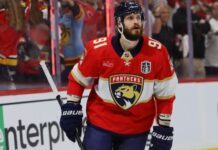




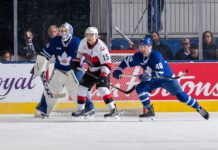




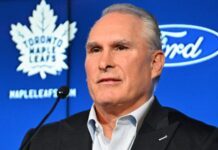
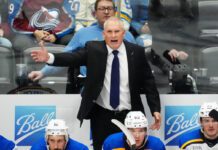


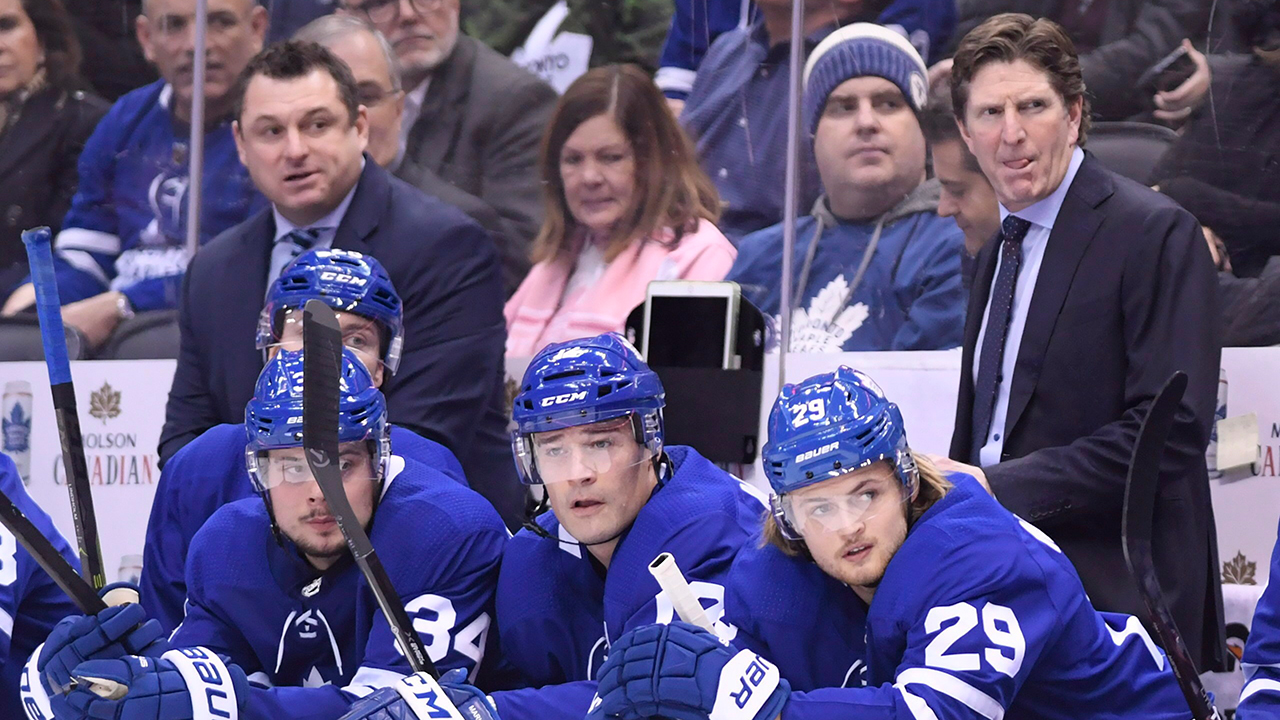








![New Leaf Anthony Stolarz on the opportunity in Toronto: “In Florida, I knew my role as a backup… Now, [Joseph Woll] and I are competing for starts… As a goalie, that’s all you can ask for” Anthony Stolarz, Stanley Cup win, now Maple Leaf](https://mapleleafshotstove.com/wp-content/uploads/2024/07/anthony-stolarz-sc-100x70.jpg)
